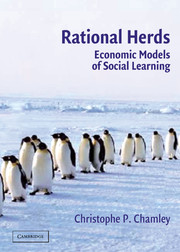1 - Introduction
Published online by Cambridge University Press: 12 January 2010
Summary
Penguins are social animals. They live in groups above the water from which they get fish for food. Unfortunately, there is more than fish in the water. From time to time, killer whales (orcas) roam under the surface waiting for some prey. Penguins are aware of the danger and would like to have some information before taking a plunge. Indeed, any sensible penguin thinks that it would be very nice if some other penguin would dive first to test the water. So what is a penguin to do? Wait. Possibly someother member of the colony who is more hungry, or has other information, will go first. Is it possible that no penguin will ever go? No, because waiting becomes more costly as hunger increases. Eventually, one or more penguins will take the plunge, and, depending on the outcome, the others will either stay put or follow en masse. This waiting game is socially inefficient. It would be better if the first individual would decide to go at least a bit earlier: the first to go is, on the margin, as well off going just a little earlier; but others strictly prefer him to go a little earlier. Actually, the penguins are well aware of this social inefficiency, which they try to remedy by pushing some poor fellow off the cliff.
First-Cousin Marriages
There is a long-standing taboo against marriages between first cousins in some parts of the world. Such taboos may entail significant costs. In the United States, about thirty states have laws forbidding first cousins to marry, but on some other continents marriages between cousins are well regarded.
- Type
- Chapter
- Information
- Rational HerdsEconomic Models of Social Learning, pp. 1 - 16Publisher: Cambridge University PressPrint publication year: 2003



